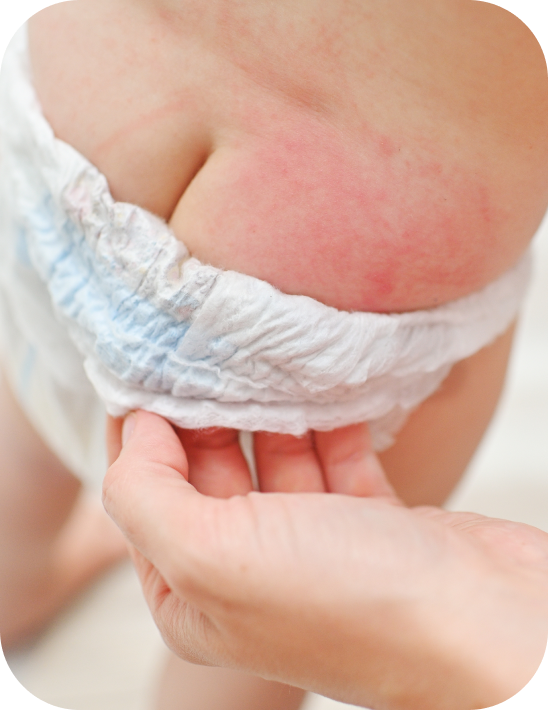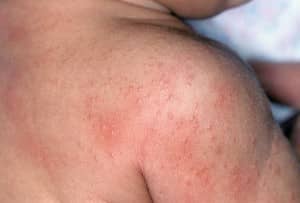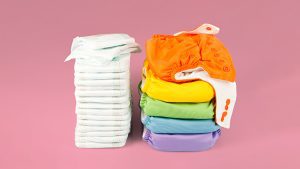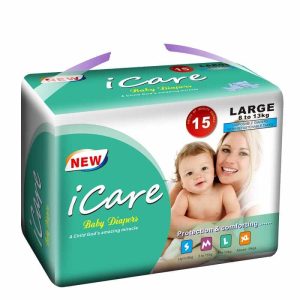Yes, baby formula can cause diaper rash. It may trigger an allergic reaction or digestive issues in some infants.
Diaper rash is a common concern for parents. Various factors can contribute to it, including baby formula. Some infants might have sensitivities or allergies to certain ingredients in formula. This can lead to digestive problems, resulting in diaper rash. If your baby develops a rash, consult a pediatrician.
They can help determine the cause and recommend the best course of action. Choosing the right formula is crucial for your baby’s comfort and health. Pay attention to your baby’s reactions and consult healthcare professionals if needed. Understanding the connection between baby formula and diaper rash can help you make informed decisions.

Credit: www.cowsmilkallergy.com
What Is Diaper Rash?
Diaper rash is a common skin condition in babies. It causes redness and irritation in the diaper area. The skin looks inflamed and sore. Diaper rash can make your baby uncomfortable.
Diaper rash can happen for many reasons. Knowing the symptoms and causes helps in preventing it.
Common Symptoms
- Red and puffy skin in the diaper area
- Skin that feels warm to the touch
- Small bumps or blisters
- Peeling or scaly skin
- Baby seems irritable or cries during diaper changes
Causes And Triggers
| Cause | Description |
|---|---|
| Wet Diapers | Prolonged exposure to wet diapers irritates the skin. |
| Chafing | Diapers that are too tight cause friction and irritation. |
| Infections | Bacterial or yeast infections can cause diaper rash. |
| New Products | New wipes, diapers, or laundry detergents may trigger rash. |
| Diet Changes | Introducing new foods or changing formula can upset the baby’s system. |
Understanding the causes helps in taking preventive measures. Identifying triggers can ease a baby’s discomfort.
Baby Formula And Diaper Rash
Many parents wonder if baby formula can cause diaper rash. This concern is common among new parents. Diaper rash can be distressing for both babies and parents. Understanding the link between baby formula and diaper rash can help you make informed decisions.
Ingredients To Watch
Some baby formulas contain ingredients that might cause diaper rash. Understanding these ingredients can help you choose the best formula for your baby.
- Dairy Proteins: Some babies are sensitive to cow’s milk protein. This can cause diaper rash.
- Soy: Soy-based formulas can also trigger reactions in some infants.
- High Sugar Content: Some formulas have high sugar levels. This can lead to frequent bowel movements, causing diaper rash.
Allergic Reactions
Allergic reactions to baby formula can also cause diaper rash. Identifying these reactions early is crucial.
Signs of an allergic reaction might include:
- Red and inflamed skin around the diaper area
- Frequent and watery stools
- Extreme fussiness or discomfort after feeding
If you notice these signs, consult your pediatrician. They may recommend a hypoallergenic formula.
Scientific Studies
When exploring the causes of diaper rash, many parents wonder if baby formula could be a contributing factor. Scientific studies provide valuable insights into this issue, helping us understand the possible link between baby formula and diaper rash.
Research Findings
Studies have shown that some babies may develop diaper rash from formula. This can be due to allergies or intolerances to certain ingredients.
Key research findings:
- Some formulas contain ingredients that may irritate sensitive skin.
- Babies with lactose intolerance may develop rashes.
- Formulas with added sugars can cause more frequent bowel movements.
A study published in the Journal of Pediatric Health found that 20% of babies experienced diaper rash after switching formulas. Another study highlighted that formulas with cow’s milk proteins often caused rashes in allergic infants.
Expert Opinions
Pediatricians and dermatologists offer valuable perspectives on this topic. They often emphasize the importance of monitoring baby’s reactions to formula changes.
Insights from experts:
- Dr. Smith, a pediatrician, suggests that parents should look for signs of allergy.
- Dr. Lee, a dermatologist, recommends hypoallergenic formulas for sensitive babies.
- Nutritionist Jane Doe advises keeping a food diary to track reactions.
Expert tips:
- Choose formulas with minimal additives.
- Consult with healthcare providers before switching formulas.
- Observe baby’s skin closely during and after feedings.
Pediatric experts agree that not all babies react the same way. Each baby’s skin and digestive system are unique, so what works for one may not work for another.
Parental Experiences
Many parents wonder if baby formula causes diaper rash. This section shares real-life stories and common concerns. Learn from other parents’ experiences.
Real-life Stories
Parents often share their experiences online. They help others understand the cause of diaper rash. Here are some real-life stories:
| Parent | Story |
|---|---|
| Jane | Jane switched to a new formula. Her baby had a rash within days. She tried a different brand, and the rash disappeared. |
| Mike | Mike noticed a rash after introducing formula. He consulted a pediatrician who suggested a hypoallergenic formula. The rash improved. |
Common Concerns
Parents have many concerns about baby formula and diaper rash. Here are some common questions:
- Is my baby allergic to the formula?
- Should I switch to a different brand?
- Could the formula ingredients be causing irritation?
These concerns are valid. Allergies or ingredient sensitivities can cause rashes. Consulting a pediatrician is a good step. They can recommend the best formula for your baby.
Preventing Diaper Rash
Diaper rash is a common concern for many parents. Babies have sensitive skin, and preventing diaper rash can be challenging. Proper care and attention can help keep your baby’s skin healthy and rash-free.
Hygiene Tips
Good hygiene is crucial in preventing diaper rash. Here are some essential tips:
- Change diapers frequently: Wet or soiled diapers irritate the skin.
- Clean gently: Use warm water and a soft cloth to clean.
- Pat dry: Ensure the skin is completely dry before putting on a new diaper.
- Use barrier creams: Apply a cream with zinc oxide to protect the skin.
- Air time: Let your baby go diaper-free for short periods.
Choosing The Right Formula
Sometimes, the type of baby formula can cause diaper rash. Consider these points:
- Check ingredients: Some formulas contain allergens that may irritate.
- Consult a pediatrician: Seek advice for hypoallergenic options if needed.
- Monitor reactions: Observe any changes in your baby’s skin after feeding.
- Switch formulas gradually: Introduce new formulas slowly to avoid digestive issues.
- Look for added probiotics: Some formulas support a healthy digestive system.
A combination of good hygiene practices and the right formula can help in preventing diaper rash. Keep your baby comfortable and happy with these simple steps.

Credit: www.neocate.com
Treatment Options
Diaper rash can be distressing for both babies and parents. Knowing the right treatment options can bring relief quickly. This section covers effective home remedies and when it is necessary to seek medical advice.
Home Remedies
There are several home remedies to treat diaper rash. These can help soothe your baby’s skin and reduce irritation.
- Change diapers often: Keep the diaper area clean and dry.
- Use warm water: Gently clean the area with warm water. Avoid wipes with alcohol.
- Air time: Let your baby go without a diaper for short periods.
- Apply ointments: Use a thick layer of diaper rash cream or ointment.
- Avoid tight diapers: Ensure diapers are not too tight to allow airflow.
- Oatmeal baths: Add a small amount of oatmeal to your baby’s bath.
When To See A Doctor
Sometimes, home remedies may not be enough. There are specific signs you should watch for.
- Severe rash: If the rash is severe or spreading.
- Blisters or sores: Presence of blisters, sores, or pus.
- Fever: If your baby develops a fever.
- Persistent rash: If the rash does not improve in 2-3 days.
- Behavior changes: If your baby seems more fussy or uncomfortable.
Consult your pediatrician if you notice any of these signs. They may prescribe a stronger cream or check for underlying issues.

Credit: www.babycenter.com
Frequently Asked Questions
Can Baby Formula Cause Diaper Rash?
Yes, baby formula can cause diaper rash. Some infants may react to ingredients in the formula.
What Ingredients In Formula Trigger Diaper Rash?
Ingredients like lactose, soy, or certain proteins can trigger diaper rash in sensitive infants.
How To Prevent Diaper Rash From Formula?
To prevent diaper rash, choose a formula designed for sensitive skin or consult your pediatrician.
Can Switching Formulas Help With Diaper Rash?
Switching formulas can help if your baby is sensitive to certain ingredients. Consult your pediatrician first.
Conclusion
Understanding the link between baby formula and diaper rash is crucial. Always consult your pediatrician for personalized advice. Monitor your baby’s reactions to formula changes. Keeping your baby’s skin clean and dry can help prevent rashes. Stay informed and prioritize your baby’s comfort and health.




